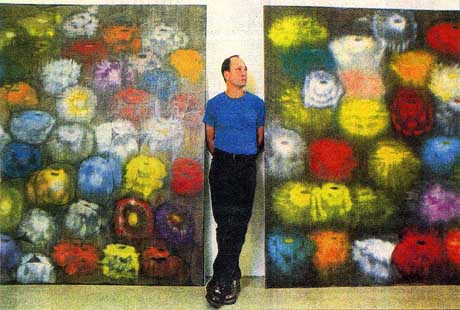ROSS BLECKNER

Ross Bleckner at the Gagosian Gallery. Photo © 1996 Luis Sinco.
Ross Bleckner's mysteriously luminous paintings sustain a breathtaking atmosphere of their own. Since 1975 he has shown at prestigious venues internationally, including a major Guggenheim retrospective and European museum tours. I had the glorious opportunity to speak to this modern master during his show at the Gagosian Gallery.
Victor Hsieh: How would you compare L.A. and N.Y.?
Ross Bleckner: New York seems more broad, L.A. more post-studio, photography-oriented and conceptual; less painterly.
VH: In your more recent shows at Mary Boone and Gagosian, I noticed more colors on your palette.
RB: Yes, I feel it is a natural progression out of my work, looking at it, and bringing a buoyancy to it in a sense of opening up. All of my work investigates different possibilities of what it means to imagine yourself within the most broad parameters.
VH: Where do you get inspiration from?
RB: Everything I look at and a lot of my own work. Mistakes. Like an alchemist; when things go wrong, you are able to efficiently focus on new possibilities. Always finding new possibilities and arrangements.
VH: What goes through your mind while painting?
RB: Everything. I think about the context, the painting and all kinds of personal relationships. My mind sometimes focuses on what I'm doing and then wanders. That's the connectedness and disconnectedness; the in-focus and out-of-focus.
VH: The "Architecture Of The Sky" seems geometrical.
RB: For me it's the vibratory quality of repetition. There's a pulsating under the surface that I'm looking for. It has a repetition that's set up in a very specific structure. It starts from the top and goes in waves.
VH: How's your movie?
RB: Great. I had a small part (As Good as it Gets) in a movie and it was a lot of fun. I worked with Jack Nicholson and saw what goes on during a movie set, which is not that much. Being a painter I like better.
VH: Your piece "Remember Me."
RB: That's what all artists whisper beneath their work. It's a mark you make that you want to leave on the world. It's what you want to be thought of, and your work represents you. It is you when you're not you anymore. When you're gone.
VH: When did you start painting?
RB: Around 18 I was very introspective. It was a sadness that made me withdraw into myself which has never left.
VH: What is in the future of Ross Bleckner?
RB: Being focused on my work and continuing it. To keep a clarity and purpose.
